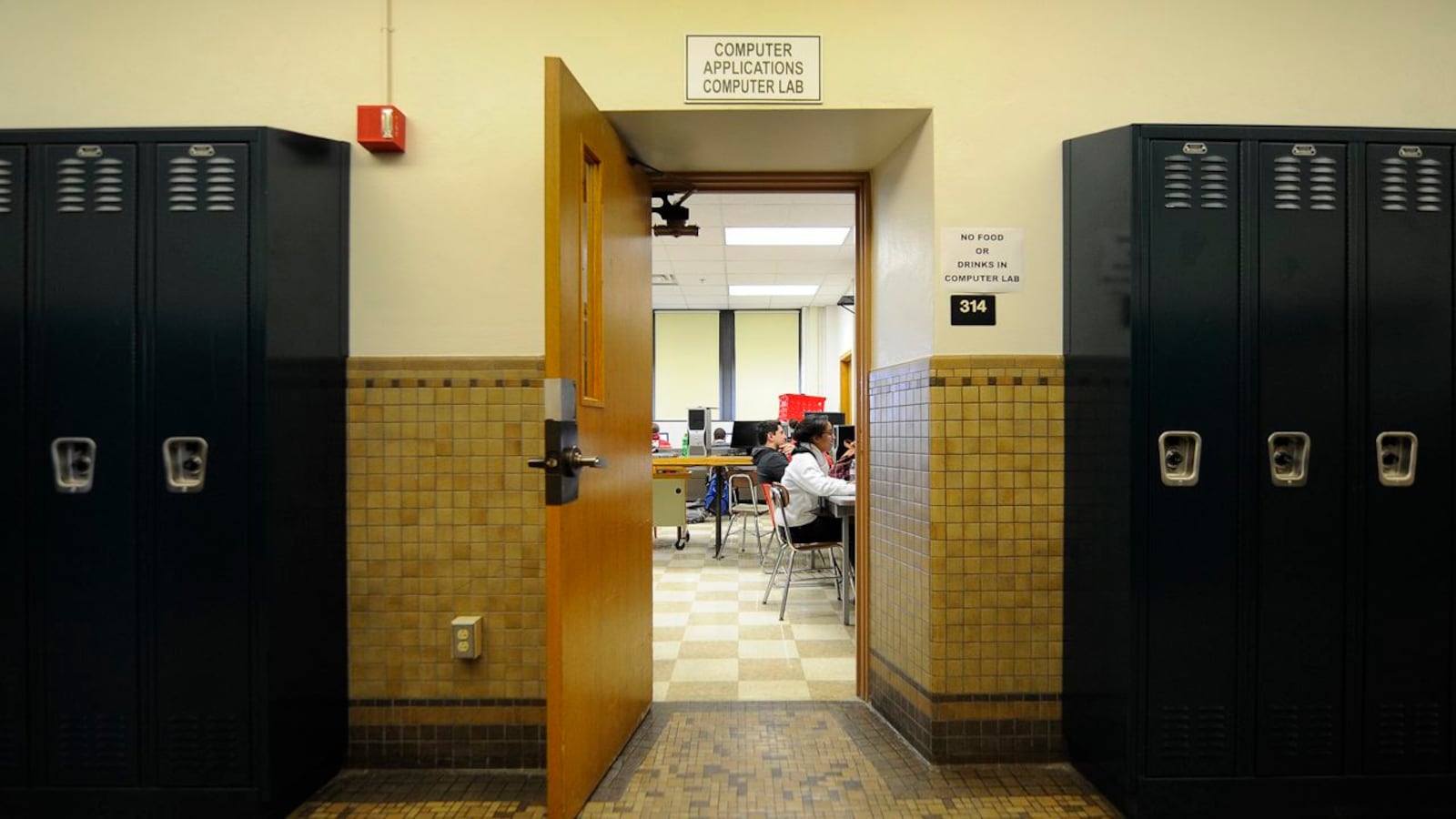Six weeks after School 43 lost the latest in a string of principals and spiraled into crisis, volunteers working to help the school say things are more orderly now — but the school still faces serious challenges.
When principal Nicole Walker left the school without warning in mid-February, Indianapolis Public Schools sent in an team — including a new principal, an extra assistant principal and a student discipline specialist — to try to stabilize the school. The district ramped up teacher training and increased focus on positive student behavior, said Jesse Pratt, a district leader overseeing the school.
These weeks later, community members and volunteers say they’ve seen improvements in student behavior but there are ongoing problems with academics.
The school was struggling long before Walker’s departure, said Bill Beranek, a retired professor who leads a group of about 15 volunteer tutors at the school. The school, which has also lost many teachers, will need a lot of attention and resources if it wants to help students recover from days or weeks of lost learning time, he said.
One third-grade classroom has churned through so many teachers over the course of the year that Beranek dubbed it the “orphan class.” After losing a teacher in the fall, students in Room 211 went through at least two more teachers — one of whom stayed just four days, Beranek said. In desperation, the school administration split the class in half, sending some students to the other third-grade class and some to a fourth-grade class.
“I just told my tutors … forget what’s going on in the class because the class is this random event,” Beranek said. “It’s just out of control.”
A teacher from the fall came back in February, and is now permanently teaching the class, he said.
Pratt could not say how long that third-grade class was without a teacher, but he said School 43 has struggled with unusually high teacher turnover. It also had trouble finding substitutes on days when teachers were absent, he said.
As a result, kids would be split up across the school, with small groups of students from a teacher-less classroom fanning out to classrooms that were staffed.
“That’s a struggle district-wide,” Pratt said. “When we don’t have enough substitutes to cover the classes, that is a policy or something that principals use to make sure that they are at least in front of a certified teacher.”
To cope with the problem, the district recently hired two “cluster” substitutes who are district employees assigned to School 43 and are available whenever a teacher is absent, Pratt said.
It’s part of a surge in staff at the school that volunteers say has dramatically improved student discipline. The district was already working to improve the climate at School 43 when Walker resigned, Pratt said. But since she left, those plans have come into place, with extra staff and support. IPS also sent in Rhonda Corr, a leader from the central office, to serve as principal for the remainder of this year.
Volunteers and district leaders agree that the extra staff has helped return order to hallways and common spaces, like the cafeteria. Since the arrival of additional staff, it’s no longer common to see groups of students roaming the halls during class, volunteers say.
“I just see a very different school,” said Leola Williams, a retired teacher who volunteers at School 43.
It’s unclear how exactly the district achieved the improvement in student behavior. Pratt attributed the improvement to the district’s emphasis on setting positive expectations for student behavior. In some cases, students have been suspended, he said.
Williams and others attributed improved school behavior to an increase in the number of students leaving the school because of suspensions or because their parents have withdrawn them. The three most difficult students in the first-grade class where Williams volunteers have withdrawn from the school in recent weeks and the class is running more smoothly, she said.
“I think they’re doing quite well,” she said. “The teacher is actually teaching every day now.”
Pratt said that he had not heard about an exodus of students, and he did not know whether speculation that the prior principal rarely suspended students is accurate. An IPS spokeswoman said suspension data is not yet available for March but — in sharp contrast with what volunteers report — the district says no students were suspended or expelled in February.
Discipline was only one of the issues at the school, however. Beranek said that the inconsistency of constantly switching teachers has left the kids he tutors far behind where they should be by this point in the year. Third-graders who are supposed to be learning long division still struggle to add the numbers on a set of dice or read a clock, he said.
“At this point, all of us tutors and teachers are all just in survival mode,” Beranek said. “These kids were getting no consistent curriculum …It was just random.”
Pratt acknowledged that School 43 had low scores on state tests last year, and some students are behind their peers academically. But based on student scores on district tests, he does not believe the problems at the school have impacted student learning.
Next year, School 43 will lose most of the extra staff it has currently. But the district has sketched a plan for keeping the school on track, including a new counselor and more staff to work with kids that have behavior issues, Pratt said.
Despite a series of short-term principals, the district also is betting that the right principal can turn the school around.
“The first step is providing strong leadership for the school,” Pratt said. “That will be someone who will provide a vision for the school and be able to lead the community, the teachers and the students in the right direction.”

